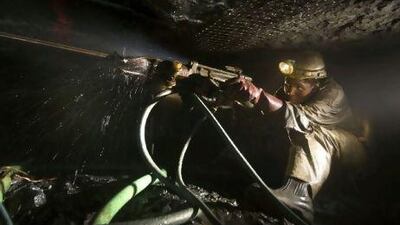Strike season, the annual face-off between South Africa's formidable unions and employers is in full swing, disrupting services and putting pressure on an already strained economy.
Rising: Joblessness
South Africa's unemployment is rising.
South Africa: strike season
Energy Coal workers ended an eight-day strike this month after accepting a pay increase between 7.5 and 10.5 per cent, depending on grades. They had demanded 14 per cent.
Petrochemicals Chemical, petrol, paper, pulp workers ended a joint two-and-a-half week strike, settling for an 8.5 per cent increase across the board and a 10 per cent rise for the lowest paid, after demanding 11 per cent.
Gold Some 200,000 gold miners have returned to work last week, after a deal for a two-year agreement for a rise of between 8 per cent and 10 per cent, depending on the level of worker experience.
The yearly confrontation costs South Africa up to 14.6 million working days, according to the labour consultants Andrew Levy Employment, and will shave the country's GDP from 3 per cent to 2.8 per cent, amounting to nearly 4 billion rand (Dh2.04bn).
Last year, a truce of sorts over the Fifa World Cup meant the winter months were unusually peaceful, but this year unions have returned to the picket lines in earnest.
Strikes have already affected many of the country's most important sectors, with workers demanding increases of up to three times the inflation rate, currently running at 5 per cent, and bosses are struggling to hold the line closer to this level.
Gold and coal mines, paper mills, chemical manufacturers and petrol stations are some of the industries that have been affected, Several weeks ago, 250 fuel stations ran dry in South Africa's industrial heartland, Gauteng province. The ensuing chaos as taxis, buses and commuter vehicles stalled sparked panic buying in parts of the country.
The official unemployment rate is 25 per cent, and the latest manufacturing figures show a plunge of almost 10 points, which has led many to accuse the unions of placing wages above long-term job provision.
One study shows South African labourers earn six times more than their Chinese counterparts, while being less efficient.
"Half of black South Africans aged 15 to 35 will probably never work because of a lack of education and access to labour markets", says the executive director of the Free Market Foundation, a private enterprise think tank in Johannesburg. Without labour liberalisation, this is not likely to change soon.
But Tony Ehrenreich, of the country's largest union federation Cosatu, takes a different stance.
"It is clear that the strikes can't be blamed for that," he says. "These figures are reflective of longer-term trends in the economy. Economists should be the last to comment on the economy."
Violence is a frequent feature of labour unrest as non-striking workers are beaten up and have been known to be murdered. One of the most blood-soaked strikes took place in 2006, featuring the country's security guard industry, which employs more than a million people. At least 60 non-strikers were killed in the space of a couple of months, before exhausted employers capitulated to union demands.
The ruling African National Congress has shown little inclination to limit Cosatu's influence, which has an alliance with the party that delivers millions of voters.
"It sends out a signal that you have to be very careful when you invest in labour-intensive sectors in South Africa," says Dawie Roodt, the chief economist with the Efficient Group.
The state itself is the country's largest employer, and spends almost half the national tax income on wages. But this has not spared it labour unrest of its own.
Last year, a strike by workers at transport company Transnet, which runs harbours and trains, cost the country an estimated 7bn rand in lost income. Workers also sabotaged trains and equipment, causing millions of dollars in damages. Although this season has been relatively mild in terms of disruption and violence, two key sectors have yet to resolve wage disputes: electricity generation, and municipal services.
Should workers at Eskom, the national power provider, walk off the job, the country could experience power cuts. The union and management are still locked in discussions.
Almost as disruptive will be the effect of a municipal strike, which frequently entails mass dumping of rubbish in the streets by garbage removal crews. At least 200,000 workers walked off the job yesterday in a strike aimed at shutting down services including garbage collection, in the latest dispute to disrupt Africa's biggest economy.
Such a stoppage will extend South Africa's "strike season", which has already hit the mining and fuel sectors, threatening to curb growth and damage a stagnant economy.
"Our demand of an 18 per cent increase across the board, or 2,000 rand, whichever is greater, is very necessary to meet the economic hardships that municipal workers suffer," the SAMWU union said in its strike pamphlet.
Employers have offered a 6.08 per cent wage increase. The union's 18 per cent demand, nearly four times inflation, is meant to make up for increasing costs of food and fuel, the labour group has said.
Previous SAMWU strikes have led to garbage piling up in city streets and slower repairs of broken water pipes.
The South African Local Government Association said the union's demands were unreasonable. "If this demand is to be met, the impact thereof will have to be passed on to local communities," it said.
The striking season is not over just yet.
* with Reuters

